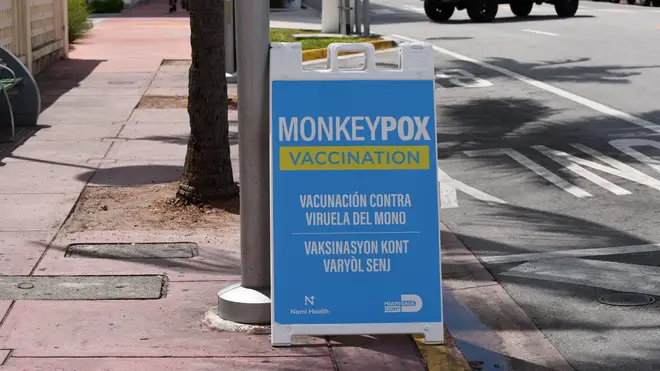
Shelagh Fogarty 1pm - 4pm
25 August 2022, 16:41 | Updated: 25 August 2022, 17:00

An Italian man has simultaneously tested positive for Monkeypox, HIV and Covid-19.
The 36-year-old contracted a fever nine days after returning home from a holiday in Spain in June, during which he reportedly had unprotected sex.
He also developed a 39C temperature, a sore throat, fatigue and headache, as well as other symptoms.
He tested positive for Covid on July 2, and within hours had developed a rash and "small, painful vesicles" on his torso, lower limbs, face and glutes.
On July 5 he was taken to hospital and transferred to the infectious diseases unit, where he tested positive for monkeypox the next day.
On July 19 he was readmitted to hospital for treatment for HIV.
A research paper says it's the first case of infection by the three viruses.
There is no evidence about whether the combination of infections can result in worse outcomes.
Read more: British Gas to give 10% of profits to poorest customers after fury at bumper earnings
The Journal of Infection said: "This case highlights how monkeypox and Covid-19 symptoms may overlap,
"Clinicians should be aware of the possibility of [Covid] and monkeypox virus co-infection, particularly in subjects with a recent history of travel to monkeypox-outbreak areas.
"As this is the only reported case of monkeypox virus, SARS-CoV-2 and HIV co-infection, there is still not enough evidence supporting that this combination may aggravate patient’s condition.
"Given the current pandemic and the daily increase of monkeypox cases, healthcare systems must be aware of this eventuality, promoting appropriate diagnostic tests in high-risk subjects."
It comes as the World Health Organisation said the number of monkeypox cases reported globally dropped by 21 per cent in the last week, reversing a month-long trend of rising infections.
The UN health agency reported 5,907 new weekly cases and said two countries, Iran and Indonesia, reported their first cases.
To date, more than 45,000 cases have been reported in 98 countries since late April.
Read more: Cost of living: Energy bills set to cost more than some mortgages, experts predict
Cases in the Americas accounted for 60 per cent of cases in the past month, WHO said, while cases in Europe comprised about 38 per cent.
It said infections in the Americas showed "a continuing steep rise".
In early July, just weeks before the agency declared the international spread of the disease to be a global emergency, WHO's Europe director said countries in the region were responsible for 90 per cent of all laboratory confirmed cases of monkeypox.
British health authorities said last week after seeing a decline in the number of new cases getting reported daily that there were "early signs" the country's monkeypox outbreak was slowing.
Monkeypox has been endemic in parts of Africa for decades and experts suspect the outbreaks in Europe and North America were triggered after the disease started spreading via sex at two raves in Spain and Belgium.
Read more: Two arrested following fatal shooting of council worker Ashley Dale in Liverpool
WHO's latest report said 98 per cent of cases are in men and of those who reported sexual orientation, 96% are in men who have sex with men.
"Of all reported types of transmission, a sexual encounter was reported most commonly," WHO said. "The majority of cases were likely exposed in a party with sexual contacts," the agency said.
Among the monkeypox cases in which the HIV status of patients was known, 45 per cent were infected with HIV.
WHO has recommended that men at high risk of the disease temporarily consider reducing their number of sex partners or refrain from group or anonymous sex.
Monkeypox typically requires skin-to-skin or skin-to-mouth contact with an infected patient's lesions to spread.
People can also become infected through contact with the clothing or bedsheets of someone who has monkeypox lesions.
With globally limited vaccine supplies, authorities in the US, Europe and the UK have all begun rationing doses to stretch supplies by up to five times.
WHO has advised countries that have vaccines to prioritise immunisation for those at high risk of the disease, including gay and bisexual men with multiple sex partners, and for health workers, laboratory staff and outbreak responders.